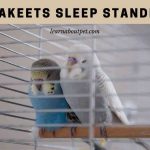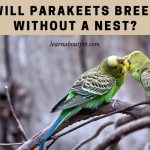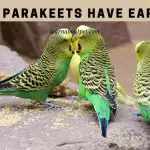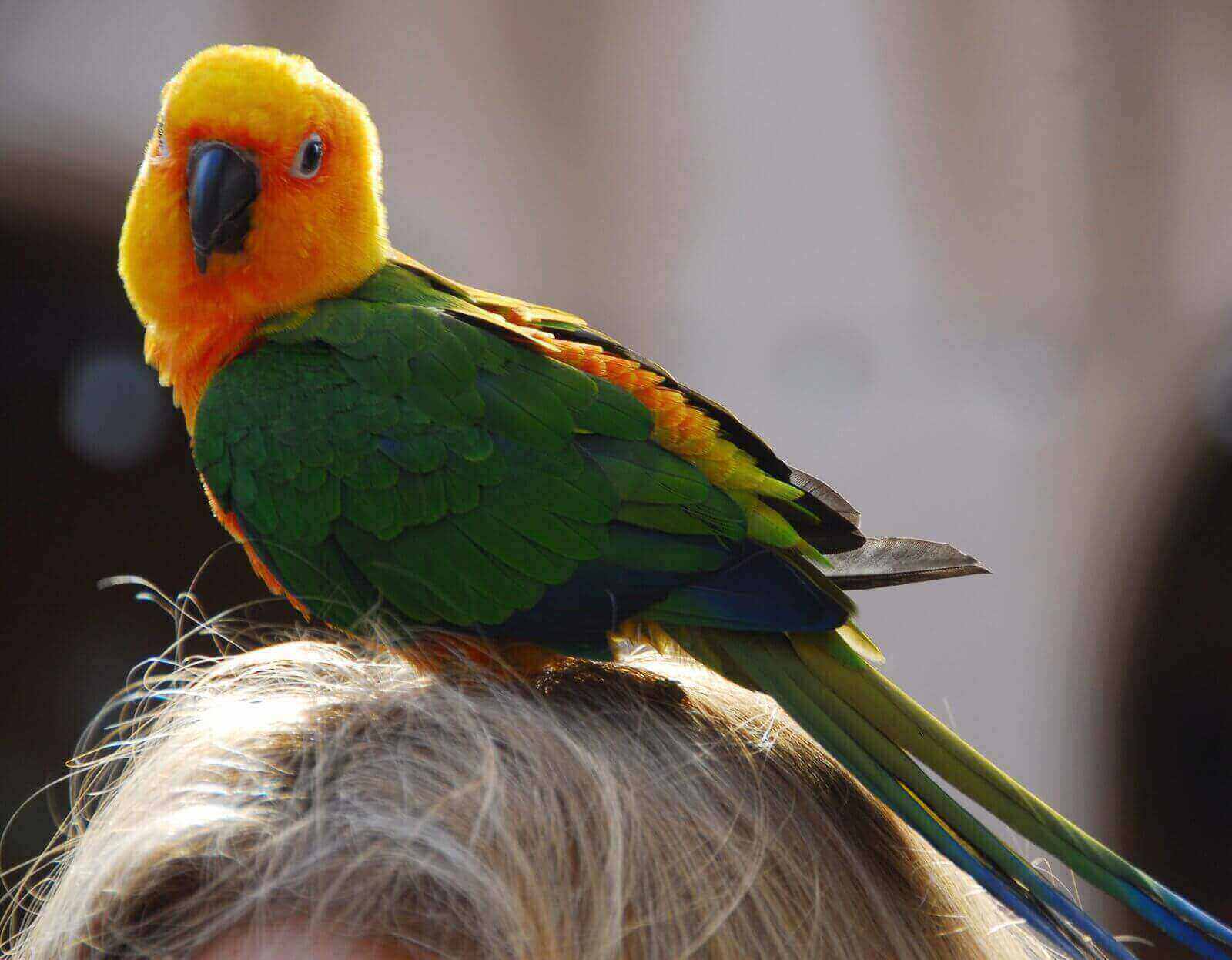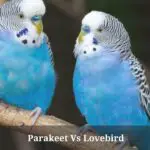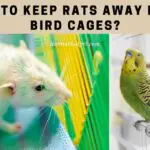In the human race kissing is a sign of affection since the known history. Kissing on cheeks, forehead, hand, or feet with one’s lips has been inscribed in societies as a gesture of respect, welcoming or showing affection, and accepting other’s importance.
Something of similar behavior is also observed in the animal kingdom-affection for the other living being.
Bird watchers and zoologists studying birds (Ornithologists) have documented and written a lot about do birds kiss. If you want to know more about the kissing birds, and answer to the query do birds kiss, keep on reading to know more about two birds kissing and parakeets kissing.
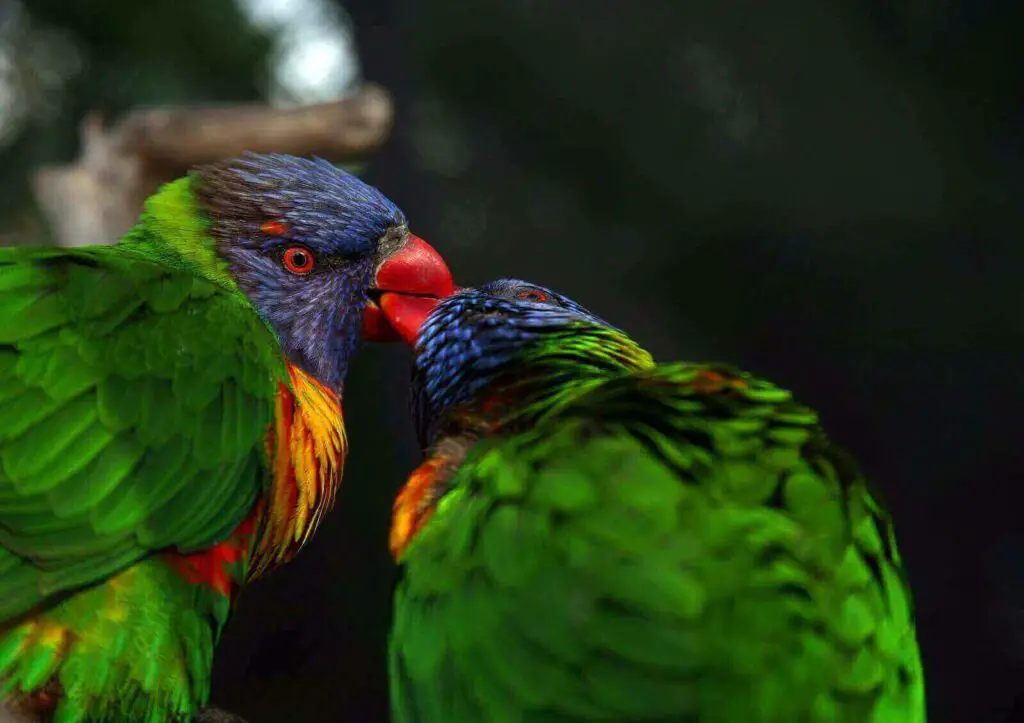
Do Birds Kiss
When we say kissing, we humans normally think of the lips. Although birds do not have lips, the specialists studying birds tell that actually, birds rubbing and tapping beaks is like kissing in humans.
So the phrase do birds kiss is true in all sense. This kind of behavior is very common during mating/courting season of the birds. Besides ‘kissing’ they preen each other’s face and head.
Some other activities of showing their affection and bonding of kissing bird are the male brings feed for the female, besides showing affection, it is more to give her nourishment for the coming conception.
What Does It Mean When Birds Kiss Each Other?
A lot of people have budgies as pets and they often ask why do budgies kiss, or why are my budgies kissing. These small love birds like to live in as a flock.
One would never see one lonely budgie in the wild. There would always be many of them in a flock. They communicate with each other in chirps and body language.
Bird watchers and bird behavior specialists tell budgies kissing is their way of developing a bond with their partner and showing affection to each other. This is their sign of love and friendship. It is a sign of courtship also.
How Birds Kiss
It is a very innocent-looking query do birds kiss. One would imagine physically it is like the kissing of human beings. Because birds don’t have lips, their kissing is somewhat different than ours.
Bird watchers and enthusiasts tell birds have very similar feelings like us human beings, like love, affection, care, bond, and they share these behaviors with their flock mates & caregivers.
Birds demonstrate these feelings especially during mating season by physical actions. Kissing is normally touching each other with their beaks around face, preening face and head feathers.
The male may regurgitate some food and feed the female. Some birds fluff and spread wings and wag tails. Some birds do an elaborate dance.
Singing and chirping in a melodious tone is most common. Although we don’t understand this, their folk easily follow it. They are always close physically and show a strong bond.
How Birds Show Affection To Humans
Some bird owners ask how do parakeets show affection. If one has adapted a bird from its baby stage and has been feeding it, it is natural the bird will develop a special bond.
With the exception of finches and canaries, most of the bird species develop strong bonds with their caregiver humans.
If it loves you it will show a certain behavior for you. The way it acts around you would be different from how it behaves around other people.
With this special bond, the bird is no more afraid of its owner and easily comes to him and sits on his shoulder or hand and eats out of it. It will show his affection as it would to his flock mates.
Some other signs of affection can be like
- ‘Kisses’ the owner as it would do with its species fellows
- The bird snuggling with the owner
- Chirping or singing on seeing him
- Flapping their wings or tail wagging
- Groom or preen caregiver’s hair while sitting on neck or shoulder
- Follow around in the house
- May even go to sleep on lap or shoulder
- It does not go away when he approaches
- It may regurgitate food for him
- It fluffs its feathers on seeing its caregiver
- It dilates and pinches its pupils
Is It Safe To Kiss A Bird?
Do birds kiss phrase refers to the birds’ behavior when they are socializing or mating and they use their beaks to caress each other’s face or neck or head area in affection.
Although it is not kissing like human beings, the do birds kiss phrase has come into being to show similar behavior in birds.
When a pet bird is affectionate with its human owner, one way of showing its affection is by kissing. One pet owner has kissing parrots and asks can he return their affection by kissing them in return.
There is no harm in showing one’s affection to one’s pet bird by kissing. However, the precaution to be observed is for infection.
See that your action does not transfer your bacteria (from your saliva, or other injuries near your lips) to the bird and vice versa.
You must be familiar with its habits and be sure that the bird will not bite you due to any reason, because a bite on or around your lips can be very painful and can get serious due to infection from Psittacosis.
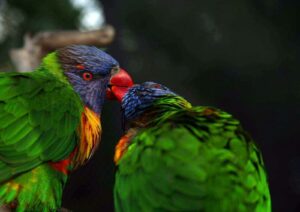
Do Birds Get Bored In Cages?
This depends on many things. Bird species, cage size and type, and relative time the bird is placed in it. Intelligence of the bird also counts towards its boredom.
Probably, for a home sparrow being caged will not matter much for it, but a parrot being intelligent and social, can affect its behavior a lot, if the cage is small and it does not have any social interaction.
A bird that is lonely is more likely to suffer more, especially if put in a small cage. Do birds kiss when bored?
Pet owners report that a pair or a flock of birds are happy in their cage if they have plenty of opportunity for social interaction with their kin and human beings and have plenty of food and toys to occupy them.
To a common man when asked do parakeets kiss, he will not be able to answer with surety.
However, the pet parrot owners and bird watchers will confirm parrots kissing.
Companionship does not let the birds get bored. Living in a flock, always has some advantage, that the birds are always happy. Having a pair of birds as pets is better than a single bird.
A pair will develop strong bond and will always have something to play with each other. Whereas the lone bird will depend mostly on its caregiver and will feel lonely & depressed when he is not around for long hours.
One should be careful in putting different species in same cage. Some species are aggressive by nature and will injure the other breed bird.
How Can You Tell If A Bird Is Stressed?
When people ask why do parakeets kiss, it actually shows the birds are happy and enjoying their moment. If they are stressed their behavior will be entirely different.
A bird conducts itself by natural habits inculcated in its genes. Any deviation in their environment or schedule will easily upset them.
Do birds kiss when stressed? When an owner develops a close bond with his pet birds, he should try to understand their body language, because that is the most observable and understandable sign, besides chirping & singing.
Just by observing the pet bird’s everyday reactions to its environment or changes to it, the owner can judge if the environment is making the bird happy or angry.
As the signs of display of love by a bird, it will also show signs of boredom, stress, and fear, which can turn into aggression. Specialists have documented many signs, some of which are discussed here.
- Puffing up. Normally a sign of happiness by the bird, but confusingly in some breeds, it means opposite reaction-fear. Can lead to aggression if approached further. Know your pet well.
- Biting. A sure sign of fear. For no apparent reason, the bird tries to bite you on your approach.
- Less talking. The bird is no more cheerful and is not singing or chirping its usual. Clearly disturbed by its surroundings, or change in surroundings.
- Shouting/Screaming. High pitched and more frequent screaming sounds mean either it is in pain or bored.
- Feather picking. This is more advanced form of being angry or stressed. It will pluck its feathers, which is much different from its grooming actions.
- Self-mutilation. This is the extreme form of stress, where the pet bird, tries to chew its own body. Needs immediate medical action by a vet and investigation.
- Stereotypical repetitive behavior. Here the bird does some action repeatedly like bobbing of head, pacing back & forth in cage, move in circles, bite cage bars. Although harmless, shows bird is bored and can lead to aggression.
- Decreased appetite. Clearly, something is wrong. If persists, could be illness. Consult a vet.
How Do You Calm A Stressed Bird?
Do birds kiss is actually the occurrence that the birds are happy. The first outward signs of stress or boredom would be less chirping, singing, and kissing.
To find the root cause of the fear, stress, or boredom of the pet bird, the caregiver should first check what has been the changes in the birds’ environment.
Sometimes even a small relocation, upsets the bird. They are very sensitive to their routines. Up by sunrise and to bed by sundown. Should not be disturbed in their sleep.
A new person or pet in the house will disturb them. Even a sight through window of an animal or bird of prey outside will upset them.
To rule out any medical or illness problem, have a thorough check by an avian veterinarian.
Some other helping suggestions from bird keepers and enthusiasts are given here.
- Move slowly. Approach your bird or its cage slowly. Fast movements towards or away always disturb an animal, and it gets defensive.
- Don’t show your aggressive behavior. Be patient with your stressed bird. If you are not calm, like yelling at it, then it will only aggravate the situation, it will be taken as an appreciation.
- Offer out of cage time. If it is in its cage, letting it out may help immediately. As a caregiver spend some quality time with the bird.
- Entertainment/Simulation. Provide toys and other distractions in his cage or outside. Change these toys frequently to keep it occupied. Birds get bored soon playing with one thing.
- Social entertainment. Birds like to live in flocks and company. They want to see their folk around them all time, with noise. Put their cage at a place where they are able to see and interact with the home people.
Final Verdict On Do Birds Kiss
Do birds kiss is often asked by folks when talking about pet birds. Well in a sense yes, birds display very much human feelings like love, care, bond, fear etc.
Although birds do not have lips, yes, do birds kiss is true. They do similar to kissing in humans by caressing with their beaks, rubbing against each other’s, and preening face feathers.

Birds like to stay close to each other and live in flocks. They develop bonds with their like folks, especially during mating season. For the same reason it is suggested to have a pair of the small birds as pets, so they are not lonely.
The caregiver should develop special bond with his avian friends and provide comfort as expected in nature. Just softly caress against Parakeet ears point to show them your love. The cage should not be very small, to stress the birds. They should be able to exercise their wings by flight.
They should be taken out of their cages regularly to give quality life and prolong parakeets lifespan or other birds lifespan. Ample toys and distractions and social interaction should be provided so they are not bored.
Birds are timid by nature and easily become frightened. The owner should assure that the birds are not frightened or stressed in their home.
Any signs of fear or stress in the birds should be investigated and action taken to remove it immediately.

Welcome to Learn About Pet. My name is Rajkumar Ravichandran and I love all pets, travel, and amazing food. I write about my passion and personal experience caring for multiple pets in this blog! ❤️
Post Disclaimer
DISCLAIMER: THIS BLOG OR WEBSITE, "Learn About Pet", DOES NOT PROVIDE YOU WITH MEDICAL ADVICE AND IS NOT A SUBSTITUTE FOR MEDICAL ADVICE. ALWAYS GET IN TOUCH WITH YOUR PERSONAL VETERINARIAN AND USE INFORMATION HERE AS GENERAL ADVICE.
The information, including but not limited to, text, graphics, images and other material contained on this website are for informational purposes only. No material on this site is intended to be a substitute for professional veterinary advice, food recommendation, diagnosis, or treatment. Always seek the advice of your veterinarian or other qualified health care provider with any questions you may have regarding a medical condition or for pet food related questions.
